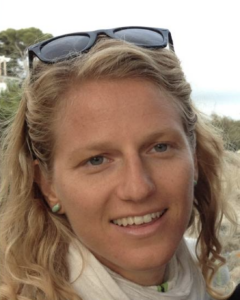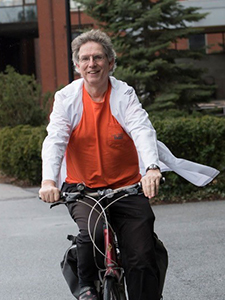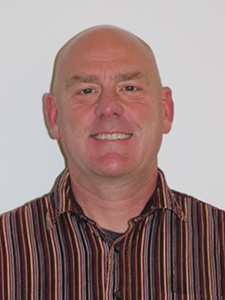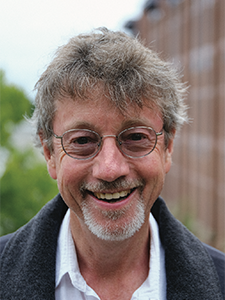I am excited to spend my sabbatical at the IGC with its unique blend of cellular, development and evolutionary biologists.
Jonathon (Joe) Howard, “International Sabbatical Programme – Cátedras de Oeiras” Former Sabbatical
The “International Sabbatical Programme – Cátedras de Oeiras” is an initiative of the Gulbenkian Collaborative Centre at the IGC, with support from the Oeiras City Council, aiming to further promote collaborative research and multidisciplinary approaches to solving scientific problems. This program allows the stay of outstanding researchers that wish to further develop their scientific activities within the context of IGC´s highly collaborative environment.
Scientists wishing to spend a sabbatical period at the IGC should follow the guidelines defined.
See guidelines Register

Coming from a landlocked place, Celia Schunter was always fascinated by the marine world. Early in her career, she started combining the study of marine organisms with genetic and molecular tools. She received her BSc in Marine Biology from James Cook University, Australia, and her master’s and Ph.D. in Genetics from the University of Barcelona, Spain. During her Postdoc at the King Abdullah University of Science and Technology in Saudi Arabia by the Red Sea, she used functional genomics to understand the effects of ocean acidification on fish within and across generations. Currently, she is an Assistant Professor at the Swire Institute of Marine Science at the University of Hong Kong, where her team continues to explore the impacts of climate change on the behavior and population dynamics of marine organisms, including the underlying molecular mechanisms of adaptation. Celia is hosted at the IGC in 2023 by Dr. Rui Oliveira, leader of the Integrative Behavioural Biology research group.

Andrew Murray got his Ph.D. from Harvard, working with Jack Szostak on artificial chromosomes. His postdoctoral work, with Mark Kirschner at UCSF, showed that cyclin synthesis and destruction regulate the cell division cycle. From 1989 to 2000, Andrew was faculty in the UCSF Physiology Department. In Harvard’s Molecular and Cell Biology department, he has directed a variety of interdisciplinary fellows’ programs, headed an integrated science class, and codirected the Systems Biology Ph.D. program. Andrew’s group works on three subjects using the budding yeast, Saccharomyces cerevisiae: 1) chromosome behavior during mitosis and meiosis, 2) how cells adapt to fluctuating environments, and 3) experimental evolution. The lab uses genetic and physiological perturbations, synthetic biology, and collaborations with theorists to understand the “rules of the game” by which cells reproduce, respond to their environment, and evolve. In education, Andrew is interested in breaking interdisciplinary barriers without sacrificing discipline.

Jason Gigley is currently an Associate Professor at the University of Wyoming. He is interested in the development of innate and adaptive immunity to the obligate intracellular parasite Toxoplasma gondii (T. gondii). His group investigates Natural Killer (NK) cells and their behavior in different stages of parasite infection, from acute to chronic infection. In addition, Dr. Gigley is also fascinated by host-microbe interactions. In particular, understanding how iron homeostasis in T. gondii and host immune cells impacts tissue pathology and the development of immunity during infection. He is from the United States where he studied Marine and Freshwater Biology at the University of New Hampshire, then moved on to a Ph.D. in Microbiology and Immunology at Dartmouth Geisel School of Medicine. He did his post-doctoral work at The George Washington University School of Tropical Medicine. Jason was hosted at the IGC in 2022 by Dr. Miguel Soares, leader of the Inflammation research group.

Jonathon (Joe) Howard is the Eugene Higgins Professor of Molecular Biophysics & Biochemistry, a Professor of Physics, and the Director of the Quantitative Biology Institute at Yale University. He is best known for his research on the mechanical properties of motor proteins and the cytoskeleton, and the development of techniques for observing, measuring, and manipulating single biological molecules. In addition to research on purified kinesin motors and other microtubule-associated proteins, Dr. Howard studies a number of cellular systems in which force and motion play key roles. These include cilia and flagella, neuronal development, mitosis, and mechanoreception in the ear and skin. Brought up in Australia, where he studied mathematics and neurobiology at the Australian National University, his career has studied and worked in many countries: a postdoc in Bristol, UK; a professor at the University of Washington Medical School in Seattle, US; and a Director at the Max Planck Institute for Molecular Cell Biology and Genetics in Dresden, Germany. In 2013 he returned to the United States where he enjoys new research projects, teaching and writing at Yale. Jonathon was hosted at the IGC by Pablo Sartori leader of the Living Physics research group, in 2022.
